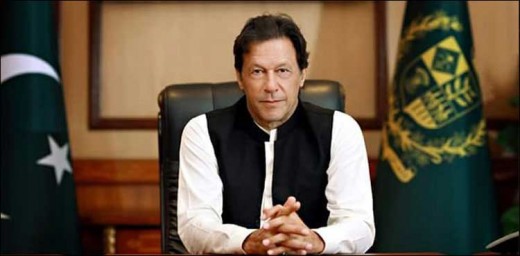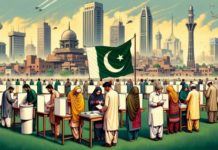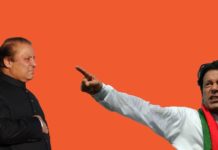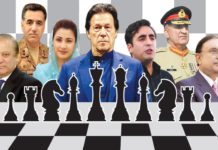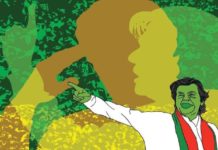A year ago, Imran khan took oath as 22nd Prime Minister of Pakistan after a long political struggle of 22 years. The promises made by Imran Khan throughout his election campaign last year really raised the expectations of Pakistani nation. The concept of ‘Naya Pakistan’ was something that galvanized the masses around Imran Khan. Particularly, the youth and urban population viewed Imran Khan as a savior of Pakistan who would lift it to glory. Therefore, the whole nation was eager to witness the concept of ‘Naya Pakistan’ translating into reality.
Undoubtedly, Imran Khan’s PTI took over government during last August in the midst of major internal and external challenges confronting Pakistan. The internal challenges included an under-performing economy, huge circular debt in power sector and poor state of governance in the country. On the external front, Pakistan was facing a relative isolation in the comity of nations and a tense security situation on its eastern border. However, it must be kept in view that the internal security challenge was overcome to a great extent towards the end of N League’s government. Now, let’s examine as to how PTI’s government performed on these four counts?
First off; the economy that was perhaps the biggest challenge for the incumbent government. Is PTI’s government outsourced?
The fact of the matter is that PTI was fully cognizant of the economic difficulties of Pakistan and yet Imran Khan gave an impression of having done all the home work of getting the economy out of troubled waters. Mr Khan’s optimism soon turned into a nightmare within first six months; once the incumbent government failed to decide whether to go for an IMF programme or not. This indecision on the part of PTI’s financial managers made the Pakistani nation pay in a big way. Although, some cash flow and oil on deferred payment from Saudi Arabia and UAE did provide temporary relief to state bank of Pakistan in its balance of payments but this too couldn’t do much to the deteriorating economic situation.
The ‘wait and see policy’ by PTI’s economic team during the initial months created an uncertainty and panic amongst the market forces. The removal of Asad Umar as finance minister in the middle of negotiations with IMF also raised many eyebrows on PTI’s decision making. This all led to a total economic fiasco that resulted into rupee devaluation by 30 %, stock markets crashed and the growth rate plunged to 2.4 %. Unfortunately, the sad tale of dismal economic performance during one year of PTI’s rule did not end here; the first budget presented by them wrapped up all the hopes of a common Pakistani. It is rather difficult to figure out as to what the current budget is all about, neither poor friendly nor business friendly.
The economic slowdown during the last one year coupled with harsh budget made the things difficult for all segments of Pakistani society. However, the poor and lower middle class have suffered the most in view of the continuous price hike, higher inflation and unjust indirect taxations imposed under the pressure of IMF. Likewise, the income of salaried class has gone into negative due to reduction in the taxable limit from PKR 100,000 per month to PKR 50,000 per month. Similarly, the mind-boggling rates of energy alongside higher discount rates of over 12% have made the business impossible in Pakistan.
Now, moving on to the governance in ‘Naya Pakistan’, one hardly finds any visible change despite tall claims made by Mr Imran Khan during his election campaign. Mr Khan always propagated merit, transparency and rule of law during his entire political struggle. Soon after taking over as Prime Minister, he pledged to the nation of making Pakistan a model state like that of Medina. Nevertheless, the seriousness of incumbent government about the reforms agenda may be judged from the mere fact that there has hardly been any serious discussion or legislation in the Parliament during the period under review. The common man is still facing the same old draconian police and high handedness of revenue and other public departments.
As far as the issue of circular debt in power sector is concerned, it stands at more or less the same level left by the Nawaz regime. In spite of an exuberant hike in the energy prices during last one year, the circular debt is haunting the cash stricken economy of Pakistan which is beyond comprehension. However, the load shedding during the ongoing summers has drastically reduced which is largely attributed to an addition of about 10,000 MW of electricity to national grid through CPEC projects undertaken by the previous regime.
On external front, PTI’s regime has performed relatively better as compared to N League’s government. As we all know that Mian Nawaz Sharif did not even bother to appoint a foreign minister for initial four years of his government and instead preferred to keep foreign ministry with himself. Resultantly, Pakistan had to pay a heavy price in terms of international isolation that it underwent over the last five years. However, the incumbent government not only appointed an experienced foreign minister in the shape of Shah Mehmood Qureshi but the Prime Minister himself led the diplomatic efforts upfront to getting the country out of isolation.
Prime Minister, Imran Khan’s visits to friendly countries like China, Saudi Arab, UAE and Qatar immediately after taking over the government did boast Pakistan’s lost confidence and image. His visit to Iran also proved beneficial in removing the mistrust between the two neighbourly countries. Imran Khan’s recent visit to USA served as an icebreaker between the two countries in a bid to revive the relationships that had reached to lowest ebb during last few years. However, the hostile Eastern neighbour, India continues to be a challenge; the situation emerging out of occupied Jammu and Kashmir after abrogation of Article 370 and 35A by Modi’s regime is alarming. Now, Kashmir is a test case for Imran Khan’s Leadership. In coming days, it is to be seen as to how the incumbent government copes with the volatile situation in Kashmir.
Having all said and done the revival of economy remains the biggest challenge for PTI’s government. So far, it appears that the PTI has handed over the Pakistan’s economy to IMF. It must be understood that whatever IMF is suggesting to the government is primarily meant to ensure that they get their money back. They are not here to put Pakistan’s economy on track; no outsider is going to do it for us.
What PTI’s leadership needs to understand is that one complete year has gone waste in blame games and now they must act before it is too late. Otherwise, PTI too might become a relic of the past.


